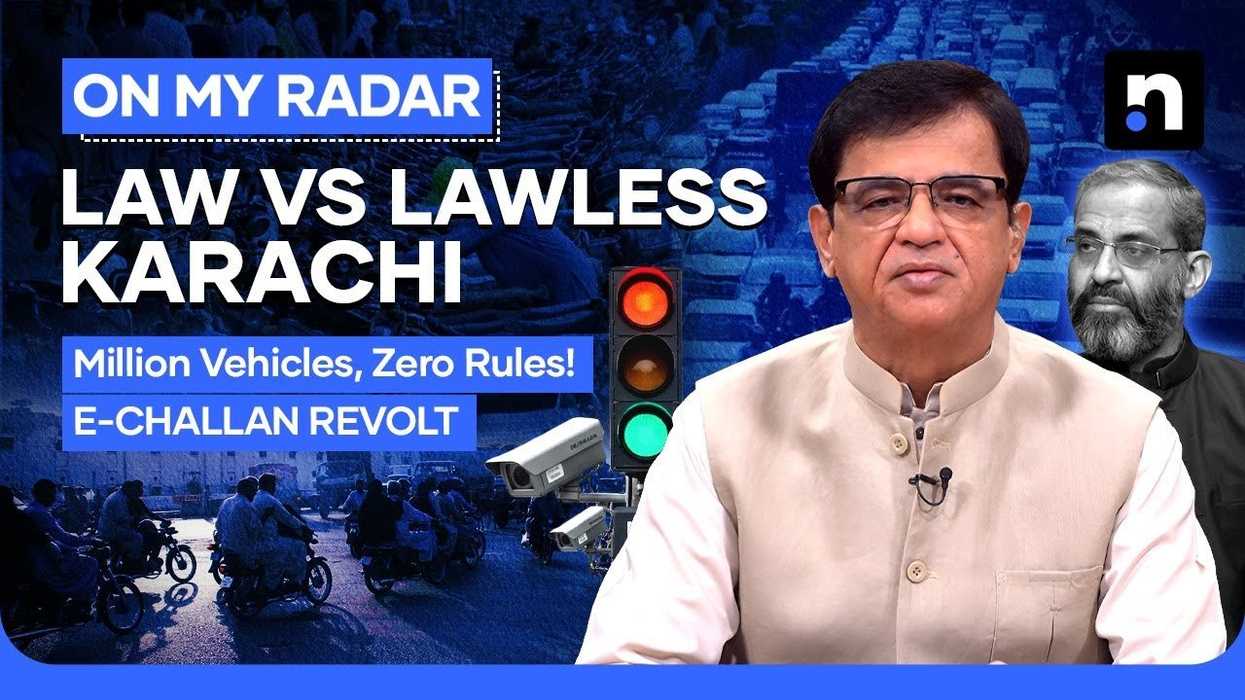E-challan rollout in Karachi divides public opinion
Kamran Khan says Karachi’s new AI-based e-challan system enforces traffic rules amid mixed public reactions
News Desk
The News Desk provides timely and factual coverage of national and international events, with an emphasis on accuracy and clarity.
Karachi has introduced an electronic traffic enforcement system, or e-challan, using artificial intelligence to curb widespread traffic violations, according to Kamran Khan,
In the latest episode of “On My Radar,” he said that the system has sparked debate among Karachi residents, who are divided over its implementation. Some motorists view traffic laws as infringements on personal freedom, believing that stopping at signals, wearing helmets, or fastening seat belts undermines their dignity. They actively seek ways to bypass the system.
Others see the e-challan initiative as a breath of fresh air for the city’s traffic culture, hoping it will eventually lead to full law enforcement across Karachi.
In select areas, including Shahrah-e-Faisal, Defense, and Clifton, authorities have installed around 1,000 high-resolution HD cameras. These devices use AI to detect traffic violations, identify license plates, and automatically generate point-based fines without human intervention.
Violations such as running red lights, speeding, or riding without helmets are captured on camera. Drivers receive e-challans at their home addresses via SMS. The points system considers the severity of violations, with repeat offenses resulting in escalating penalties, including license suspension and potential national ID card blockage.
“Whether it’s stopping at a red light, wearing a helmet, or fastening a seat belt, the rules are now non-negotiable,” Khan said. He noted that Karachi’s previously chaotic traffic environment has made even minor lapses potentially dangerous. AI monitoring, he added, leaves little room for reckless driving.
The e-challan system also offers an incentive for timely compliance. Drivers who pay fines within 14 days receive a 50% discount, while late payments increase penalties. A 21-day window allows full payment, after which fines double. First-time offenders may be excused if they provide a written assurance, but repeated nonpayment leads to strict enforcement measures.
Despite its aims, the rollout has met resistance. Jamaat-e-Islami has challenged the system in the Sindh High Court, citing concerns over road conditions, vehicle ownership verification, and the fairness of imposing heavy fines without adequate signage. Many streets in Karachi remain damaged, poorly lit, and without functioning traffic signals, fueling criticism of the policy.
Critics also argue that the e-challan system was introduced without adequate public awareness campaigns. Traffic authorities, however, maintain that they coordinated with multiple government departments, including Excise and Taxation, Transport, Mass Transit, National Radio and Telecommunications Corporation, and the law department, before launching the system. An intensive awareness campaign and a six-month trial phase with dummy e-tickets tested accuracy, reliability, and public response, according to Karachi Traffic Police.
Authorities also set up 11 centers to address disputes. Legitimate complaints can result in the cancellation of e-challans.
Khan emphasized that the system represents more than road safety enforcement; it marks a transformative step in Karachi’s traffic culture. “This is a revolutionary move toward reforming how people drive in the city. Roads are a shared responsibility, not a stage for reckless stunts,” he said.
The e-challan rollout is currently limited to specific high-traffic areas. Authorities hope its expansion will gradually improve adherence to traffic rules citywide, fostering safer, more disciplined driving behavior.








Comments
See what people are discussing